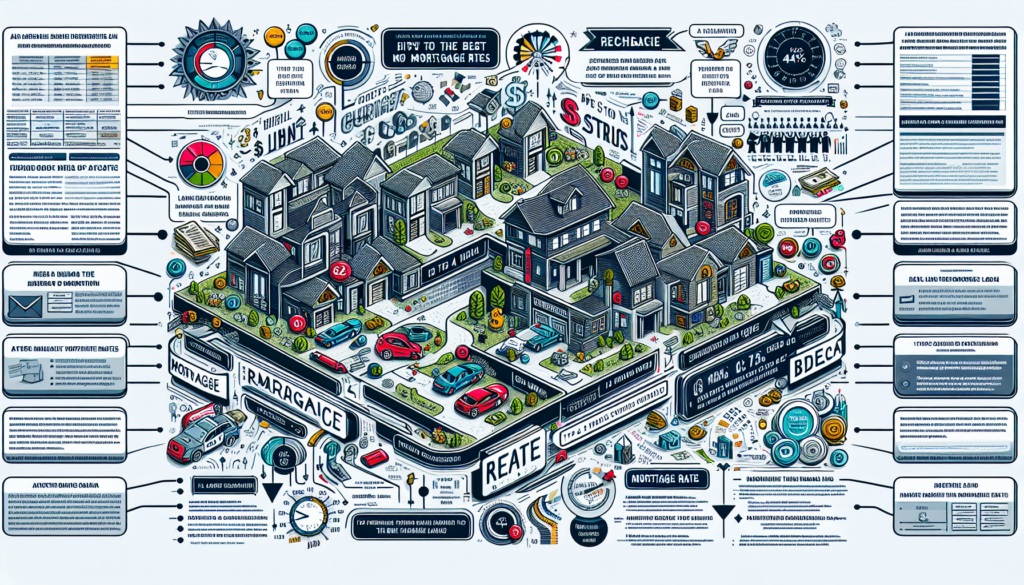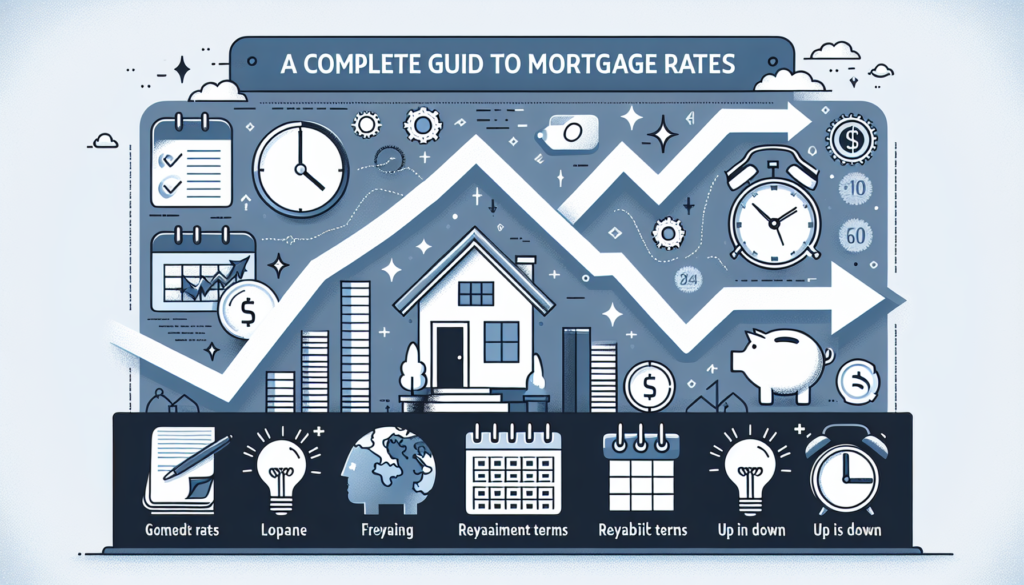Looking to buy a new home in Malaysia? It’s important to have a solid understanding of mortgage rates to make the best financial decision. In this complete guide, we’ll break down everything you need to know about mortgage rates in Malaysia. From the basics of how they are calculated to the factors that can affect them, we’ve got you covered. Whether you’re a first-time homebuyer or a seasoned pro, this friendly and informative article will give you all the information you need to navigate the world of mortgage rates in Malaysia. So grab a cup of coffee, sit back, and let’s get started!
Factors Affecting Mortgage Rates in Malaysia

Economic Conditions
The economic conditions of a country play a significant role in determining mortgage rates. When the economy is strong and stable, there is usually a higher demand for loans, including mortgages. This increased demand can lead to higher interest rates. On the other hand, during periods of economic downturn or recession, there may be a decrease in demand for loans, resulting in lower mortgage rates.
Loan Tenure
The tenure of a mortgage loan refers to the length of time over which the loan will be repaid. Generally, the longer the loan tenure, the higher the mortgage rate. This is because lenders take on more risk when providing loans for an extended period. Shorter loan tenures, on the other hand, usually come with lower interest rates.
Borrower’s Credit Score
Your credit score is an important factor that lenders consider when setting mortgage rates. A higher credit score indicates a lower risk of defaulting on loan repayments, resulting in more favorable interest rates. On the other hand, if your credit score is low, lenders may charge higher mortgage rates to compensate for the increased risk they take on by lending to you.
Loan-to-Value (LTV) Ratio
The loan-to-value ratio refers to the percentage of the property’s value that you are borrowing. Lenders typically offer more attractive mortgage rates to borrowers with lower LTV ratios. A lower LTV ratio means that you have a larger down payment and are borrowing a smaller portion of the property’s value, reducing the lender’s risk.

Fixed vs. Variable Mortgage Rates
Mortgage rates in Malaysia can be either fixed or variable. Fixed mortgage rates remain the same throughout the loan tenure, providing borrowers with a sense of stability and predictability. Variable mortgage rates, on the other hand, are linked to a benchmark interest rate and can fluctuate over time. While variable rates may start off lower, they are subject to market fluctuations and can increase or decrease in the future.
Loan Amount
The loan amount you request can affect the mortgage rate you are offered. Typically, larger loan amounts may come with higher interest rates. This is because lenders incur more risk when providing larger loans and may charge higher rates to compensate for that risk.

Interest Rate Pricing
Different lenders may have different pricing for their mortgage rates. It’s essential to compare offers from various banks and financial institutions to ensure you are getting the best possible rate. Some lenders may offer promotions or preferred rates for specific borrowers, so it’s essential to shop around and negotiate for the most favorable pricing.
Type of Property
The type of property you are purchasing can also impact the mortgage rate you are offered. Lenders may have different rates for residential properties, commercial properties, and properties located in different areas. Additionally, new properties may come with different rates compared to older ones. It’s important to discuss these factors with your lender to understand how they may affect your mortgage rate.

Type of Loan
Different types of loans may have different mortgage rates. For example, first-time homebuyers may have access to special loan programs with lower interest rates. Government-backed loans, such as those offered by the National Mortgage Corporation or special housing schemes, may also come with different rates compared to conventional loans. Discussing your options with your lender can help you determine the best type of loan for your situation.
Lenders’ Profit Margin
Finally, lenders’ profit margins can influence mortgage rates in Malaysia. Banks and financial institutions operate for-profit, and their rates reflect their need to generate revenue. Each lender may have different business strategies and objectives, leading to varying mortgage rates. It’s crucial to research and compare lenders to find the most competitive rates in the market.
Overview of Mortgage Rates in Malaysia

What are Mortgage Rates?
Mortgage rates refer to the interest rates charged on mortgage loans. These rates determine the cost of borrowing and significantly impact the total amount you will repay over the loan tenure. Mortgage rates can vary depending on various factors, including market conditions, loan terms, and the borrower’s profile.
Types of Mortgage Rates
In Malaysia, there are several types of mortgage rates available to borrowers:
Fixed-Rate Mortgages
A fixed-rate mortgage offers a set interest rate throughout the loan tenure. Borrowers who prefer stability and predictability in their monthly repayments often opt for fixed-rate mortgages. These rates generally remain the same, regardless of market fluctuations.
Variable-Rate Mortgages
Variable-rate mortgages, also known as floating-rate mortgages, have interest rates that fluctuate over time based on a benchmark rate, such as the Base Rate. These rates can vary from month to month or be adjusted at specific intervals. Variable-rate mortgages can be advantageous during periods of low interest rates but come with the risk of increasing rates in the future.
Semi-Fixed-Rate Mortgages
Semi-fixed-rate mortgages combine elements of both fixed and variable rates. The initial portion of the loan may have a fixed interest rate, while the remaining portion is subject to a variable rate. This type of mortgage offers some stability while also allowing borrowers to benefit from potential rate decreases.
Blended-Rate Mortgages
Blended-rate mortgages consist of a fixed rate for a specific period, followed by a variable rate for the remainder of the loan tenure. This type of mortgage allows borrowers to enjoy the stability of a fixed rate in the beginning, with the potential for lower rates in the future.
Flexi Mortgage Rates
Flexi mortgage rates are flexible loans that allow borrowers to deposit any excess funds into an offset account, reducing the loan principal and interest charged. These types of mortgages can help borrowers save on interest costs and potentially shorten the loan tenure.
How are Mortgage Rates Calculated?
Mortgage rates in Malaysia are typically calculated based on several components:
Base Rate (BR)
The Base Rate is the benchmark rate used by banks to determine their lending rates. It is set by each individual bank and is influenced by factors such as the Overnight Policy Rate (OPR) set by Bank Negara Malaysia and the bank’s cost of funds. The Base Rate serves as a reference point for the interest rate charged on loans, including mortgages.
Spread
The spread is an additional margin added to the Base Rate by the lender. It represents the lender’s profit margin and covers the bank’s operational costs, as well as the risk associated with the loan. The spread can vary between lenders, so it’s important to compare offers to ensure you are getting the most competitive rate.
Effective Lending Rate (ELR)
The Effective Lending Rate represents the total interest rate charged on a mortgage loan. It is calculated by adding the Base Rate and the spread. The ELR provides borrowers with a clear understanding of the total cost of borrowing.
Loan Packages
Lenders may offer various loan packages with different interest rates and features. These packages can include benefits such as interest rate discounts, flexible repayment options, or promotional offers. It’s important to evaluate and compare different loan packages to find the one that best suits your needs.
Mortgage Rate Trends in Malaysia
[Insert relevant video on mortgage rate trends in Malaysia]
Understanding the mortgage rate trends in Malaysia can help borrowers make informed decisions regarding their home loans. Here are some key trends to consider:
Historical Trends
Over the years, mortgage rates in Malaysia have experienced both ups and downs. The rates have been influenced by factors such as changes in the Overnight Policy Rate (OPR), economic conditions, and global market trends. It’s essential to analyze historical trends to gain insights into how rates may behave in the future.
Current Market Conditions
The current market conditions can have a significant impact on mortgage rates. Factors such as inflation, economic stability, and geopolitical events can influence interest rates. Staying up to date with market news and economic indicators can provide valuable information on the direction rates may take.
Impact of COVID-19
The COVID-19 pandemic has caused significant disruptions in economies worldwide, including Malaysia. As a response to the crisis, the central bank, Bank Negara Malaysia, has implemented various measures, including reducing the Overnight Policy Rate (OPR) to stimulate economic recovery. These measures have resulted in lower interest rates, creating opportunities for borrowers to secure favorable mortgage rates.
Future Rate Forecasts
Financial institutions and economic analysts often provide forecasts regarding future mortgage rates. These forecasts are based on various factors and can help borrowers make decisions about their mortgages. However, it’s important to note that these forecasts are not guarantees, and market conditions can change unpredictably.
Why Should You Pay Attention to Mortgage Rates?
[Insert relevant video on the importance of paying attention to mortgage rates]
Paying attention to mortgage rates is crucial for several reasons:
Cost of Borrowing
Mortgage rates determine the cost of borrowing. Even a small difference in interest rates can have a significant impact on the total amount you will repay over the loan tenure. By securing a lower mortgage rate, you can save a substantial amount of money in interest payments.
Monthly Repayments
Mortgage rates directly affect your monthly repayment amount. Lower rates result in lower monthly payments, making homeownership more affordable. By monitoring mortgage rates and taking advantage of favorable rates, you can better manage your monthly budget.
Long-Term Financial Planning
A mortgage is a long-term commitment, often spanning several decades. By paying attention to mortgage rates, you can plan your finances more effectively. If rates are expected to increase in the future, you may consider locking in a fixed-rate mortgage to secure a predictable repayment plan.
Refinancing Opportunities
Market conditions and changes in mortgage rates can present refinancing opportunities. Refinancing allows borrowers to replace their current mortgage with a new one that has more favorable terms, including lower interest rates. By paying attention to mortgage rates, you can identify when it may be beneficial to refinance your loan, potentially saving money in the process.
In conclusion, understanding the factors that affect mortgage rates in Malaysia and staying informed about market trends can help you make informed decisions when applying for a mortgage. By considering these factors and paying attention to rates, you can secure the most favorable mortgage terms, save money in interest payments, and better manage your long-term financial goals.
